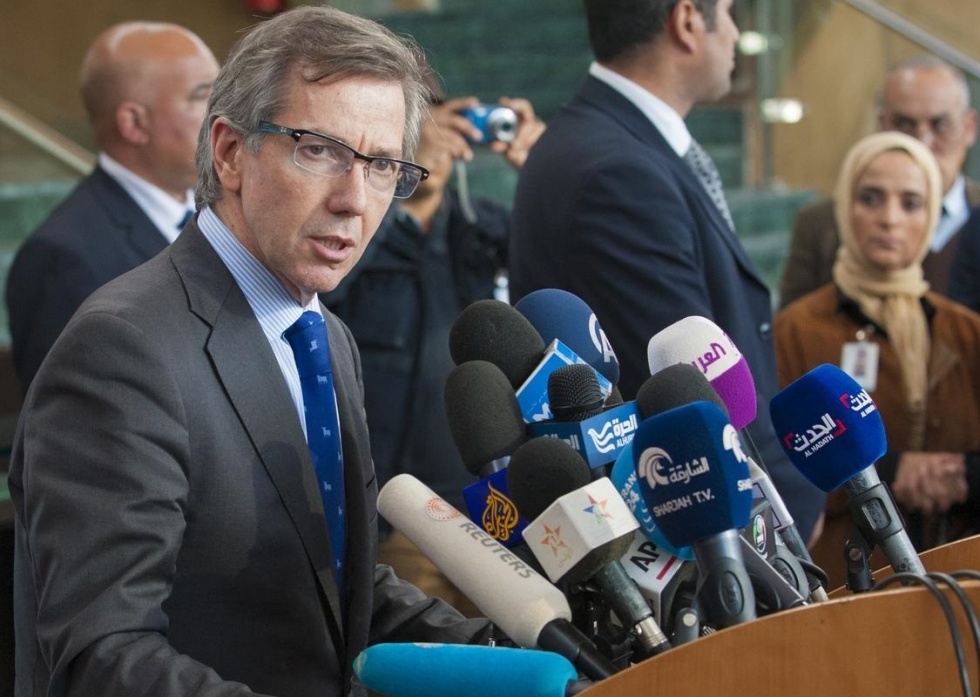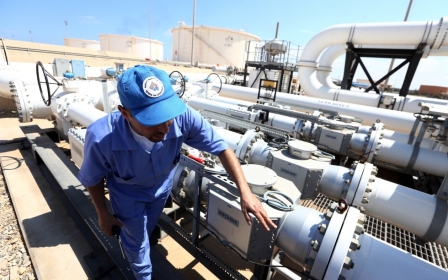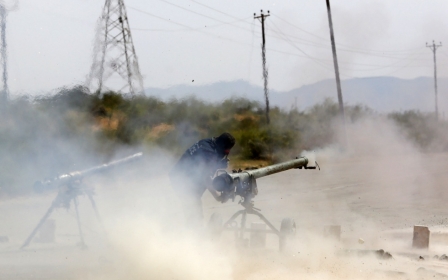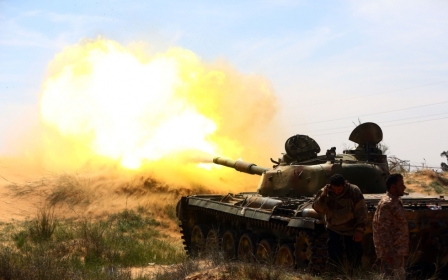Libya could see unity deal in days despite violence: Leon

The UN remains hopeful it can reach a unity deal in Libya despite ongoing violence, UN envoy Bernardino Leon said on Sunday.
"For the moment, no one is leaving. We have had a difficult moment... and after these attacks there was a possibility either to cancel the dialogue or to lose some of the delegations," Leon told reporters in Morocco where Libya’s two leading rival camps have been trying to hammer out a deal since Friday.
According to Leon, a draft deal could be ready as early as Tuesday.
The delegates "agreed that at the end of the day, even with this military escalation, it is more important what we are trying to do here. It is more important to stay here,” Leon added.
Libya’s Tobruk-based government seemed to support Leon’s statements, on Sunday saying that a candidate for the post of unity prime minister could be announced as early as this week.
"It is possible that the political rivals can agree on a prime minister and two deputies within the next two or three days in the course of the talks," Abu Bakr Baira, a member of the Tobruk-based parliament, told the Anadolu Agency.
Violence continues
The positive overtures come despite ongoing violence, which has seen Tobruk “loyalists” attack rival Libya Dawn militias in the capital Tripoli.
The assault began on Friday, as representatives from the rival Tobruk and Tripoli-based governments sat down in Morocco for long delayed talks.
"The government salutes the operations launched by army units south of Tripoli which constitute the start of an offensive to liberate Tripoli and its suburbs," Tobruk said on Facebook.
The announcement came as the Libya Dawn forces that first seized control of Tripoli last summer and then worked to set up a rival government in the capital, said that they had clashed with a group of gunmen who infiltrated Aziziya, 35 kilometres south of Tripoli, and captured a number of them.
The assault saw representatives from Tripoli nearly withdraw from talks, although Leon has since confirmed “that everybody is on board, everybody is here and hopefully these consultations by tomorrow will produce positive results”.
But on Sunday, Tobruk’s Prime Minister Abdullah al-Thinni, said that he had started negotiating arms deals with foreign arms suppliers in an apparent breach of the international arms embargo. The weapons ban was imposed on Libya by the United Nations Security Council during the 2011 uprising which toppled longtime strongman Muammar Gaddafi and it continues to have the backing of the five permanent members.
"I have held talks with the representatives of foreign arms manufacturers to supply the Libyan army with equipment," Thinni wrote on his Facebook page.
He added that he met the representatives of the arms manufacturers in eastern Libya.
Tobruk has repeatedly urged the UN to repeal the arms embargo to help them battle what they insist are "extremist group" in Libya.
While the calls first emerged in February in response to the rise of the Islamic State in Libya, there are fears that the arms would soon be turned on Libya Dawn and other rival militias who Tobruk has long accused of being “Islamists” and of supporting a range of militant groups.
Libya Dawn forces, however, are currently clashing with Islamic State militants near Sirte, leaving Libya Dawn facing opponents on two fronts.
"Libya is not divided into two camps. Libya is fragmented," Leon warned on Sunday.
In a joint statement, France, Germany, Italy, Spain, Britain and the United States urged the participants in the talks to "enter into the discussions constructively and in good faith in order to reach agreement on a national unity government and arrangements for a ceasefire as quickly as possible."
"We call on the Libyan political leaderships to act responsibly and to make clear their support for the dialogue and call on them to exercise authority over military and militia leaders and ensure civilian oversight and control of their actions and disavow military actions not taken in that framework," they added.
Oil war
The two rival governments have also recently come to blows over the country’s oil resources.
Last Monday, Tobruk severed ties the Tripoli-based National Oil Corporation.
"The legitimate Libyan government... is the only legitimate channel that has the right to deal and to contract companies to authorise gas and oil sales," it said in a statement.
To be valid, such sales must be made via the new NOC headquarters in the eastern city of Benghazi and approved by company chairman Al-Mabrook Abu Seif, it said.
The statement, published on its Facebook page, did not elaborate on how new contract payments should be made, but anyone who violates its decisions will be prosecuted, it said.
On Thursday, the NOC board in Tripoli hit back.
"The NOC's position is neutral and receives no directives from either the Tripoli- or Baida-based governments and operates in complete independence from both sets of authorities," it said in a statement in English.
The NOC said it would continue to operate from Tripoli, where it was founded in November 1970, and would "remain an independent institution that operates outside political disputes".
New MEE newsletter: Jerusalem Dispatch
Sign up to get the latest insights and analysis on Israel-Palestine, alongside Turkey Unpacked and other MEE newsletters
Middle East Eye delivers independent and unrivalled coverage and analysis of the Middle East, North Africa and beyond. To learn more about republishing this content and the associated fees, please fill out this form. More about MEE can be found here.




